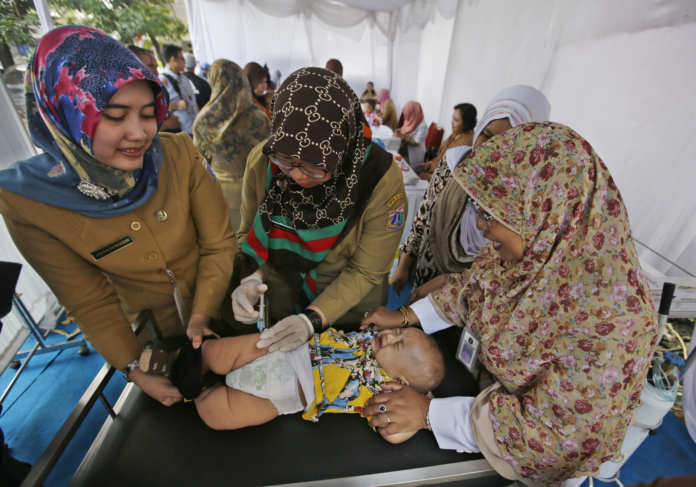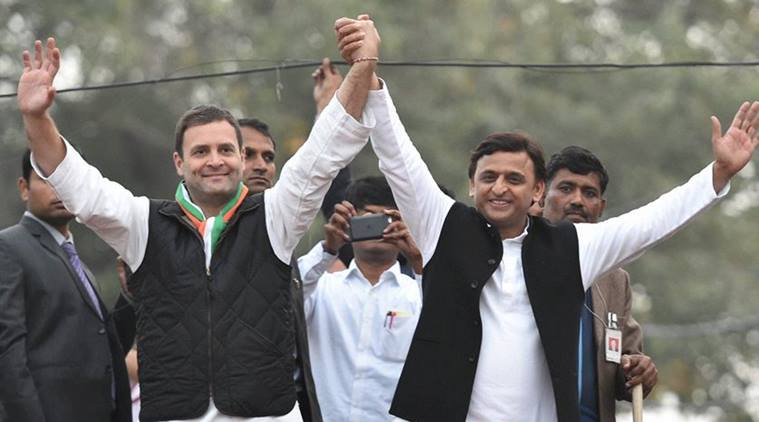
A scandal over fake vaccines given to children prompted angry and confused parents to physically attack a doctor in the Indonesian capital in a sign of deep-seated problems in the country’s health system.
Since last month, vials marked as vaccines but filled with saline solution and antibiotics have been discovered at 37 hospitals and clinics in nine cities, according to the Food and Drug Agency. So far, 23 people have been arrested, including three doctors. The number of affected children is still being investigated but could be significant in a country of more than 250 million people.
Indonesia President Joko “Jokowi” Widodo this week visited a clinic where nearly 170 children were to be revaccinated. He asked for patience while police continue to investigate an “extraordinary crime” of bogus vaccines allegedly going back as far as 2003.
“We are in crisis right now,” said Dr. Aman Bhakti Pulungan, head of Indonesia’s Pediatrician Association. “This is a medical emergency, and we have to overcome this.”
He said he is not aware of any children dying as a result of not being protected against diseases they were believed to have been vaccinated against, but added it’s possible some kids could have gotten sick without being detected. The fake vaccines involved a number of shots routinely given to children, including for measles, whooping cough, hepatitis and diphtheria.
The counterfeits were falsely labeled as imported brands, Pulungan said. He believes the number of children affected is likely small, given that only 1 percent of vaccines administered nationwide are imported. The government began revaccinating children this week free of charge at affected hospitals and clinics, including 14 in the capital Jakarta and its outskirts.
Local television footage this week showed a mob of angry parents at Harapan Bunda Hospital in eastern Jakarta arguing with a doctor and then punching him and spitting on him before security officers broke up the brawl. Other parents took their rage to the government, complaining to members of parliament and demanding help.
Jane Soepardi, the director of Surveillance, Health Quarantine and Epidemiology at the Health Ministry said Friday the government estimates about 5,000 children from 4.8 million targeted this year for immunization, have gotten fake vaccines.
“Fake vaccines arose because there was a scarcity of vaccine a few years ago that led hospitals and clinics to look for imported vaccines,” she said. “Also because the middle class demanded imported vaccines rather than locally made.”
She said the fakes did not contain harmful substances but it’s possible the unsafe process of producing them could cause infections in children they were administered to.
Health Minister Nila Moeloek has called for calm and warned parents not to panic, but distrust of the health system runs deep in a country rife with corruption, overcrowded hospitals and a lack of qualified doctors. For those who can afford it, Singapore or Malaysia are often the first choice for treatment.
Danang Susilo, the father of 14-month old Chelea, said he is worried about his daughter’s health even though doctors from Karya Medika Hospital at Bekasi on the outskirts of Jakarta assured him the fake vaccine she received was harmless.

“I was shocked and very disappointed when the hospital management asked me, along with about 300 other parents to bring our children for revaccination, because the vaccine that is injected into our children turned out to be fake,” he said. “How could this happen?”
“We need a medical check-up, not only an explanation,” he said. “We need concrete compensation.”
In 2013, the Food and Drug Agency received a report from British pharmaceutical company GlaxoSmithKline about the circulation of counterfeit vaccines bearing its name. The perpetrator was caught and fined less than $100. Additional problems were discovered in 2014 and 2015. This year, PT Sanofi-Aventis Indonesia, a subsidiary of French pharmaceutical company Sanofi, notified the National Police about fake vaccines using its product labels, according to the agency.
Dr. Kartono Mohammad, former head of the Indonesia Medical Association, said the regulations are already in place to ensure that safe vaccines are administered, but enforcement and monitoring are weak. He said that the vaccine scandal is a symptom of a much larger problem, and that the country’s entire health system should be overhauled.
“The attitude of the Indonesian people, especially the middle class, is that they look at the building and the facility and they say: This is the best hospital,” he said. “But nobody knows if it really is a good hospital or not because there is no quality control, no quality assurance done by the government.”
From Agencies, Feature image courtesy AP

























